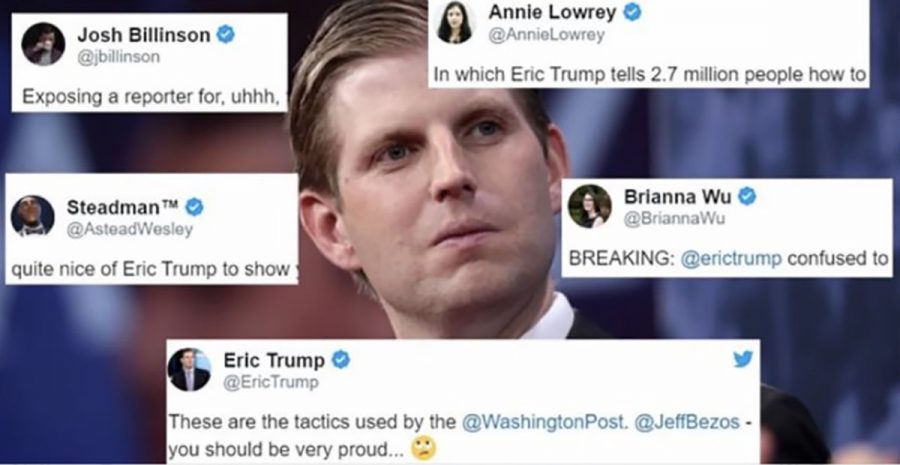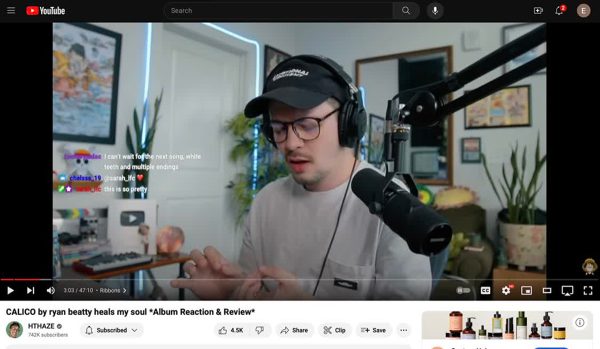Eric Trump fuels the fire in a war against journalism
In a tweet criticizing basic investigative journalism, Trump deserves criticism for his lack of knowledge about how journalism reports on his organization
More stories from Rebecca Mennecke
Photo by Submitted
Journalists spend years dedicating themselves to reporting the truth — and only the truth. By building credibility of reporting the truth, the public can then trust what the journalist has to say.
Eric Trump recently tweeted an alarming tweet on Friday that created ripples around the media — particularly resonating with journalists.
The tweet was captioned: “These are the tactics used by the @WashingtonPost. @JeffBezos – you should be very proud…” with a rolling-eyes emoji.
Trump attached a screenshot of an email from David Fahrenthold, a Washington Post journalist, 2000 Harvard University graduate and the 2017 Pulitzer Prize for National Reporting winner, according to the Washington Post. The email is as follows:
Mr. Mull —
I’m very sorry to bother. I’m a reporter for the Washington Post, and I cover the Trump Organization
as a business. As part of that, I try to make sure every Trump Org employee has my contact information. You know the company so much better than I ever could. I’d like your help to make sure I don’t miss something important.
If you ever want to get in touch with me, I’d be glad to talk “on background,” meaning I’d never use your name in any story, or tell anyone else that we spoke. All my contact information is below, including details on how to reach me on encrypted apps.
Also, if you ever want to send me documents anonymously, you can do it online at this encrypted site: https://www.washingtonpost.com/securedrop/. Or just do it the old-fashioned way! Send a no-return address package to the street below.
Thanks very much for your time,
David Fahrenthold
The Tweet is problematic in at least two ways.
First, Trump insinuates that Fahrenthold is doing his job incorrectly. In fact, Fahrenthold is doing his job respectfully and correctly, as far as I can tell. (Though, I’m no supervisor at the Washington Post.) Often, people employed at an organization won’t speak badly about that organization for fear of losing their position and receiving negative backlash. If a journalist can’t use anonymous sources, they often won’t receive vital information in holding power accountable.
Second, Trump just shared a way to share information on the Trump Organization with the entire world. So, if anyone has a problem with the organization, everyone in the world now has the contact of the correct Washington Post journalist.
Trump’s tweets created an outlash on Twitter, with some particularly fiery views in defense of journalists.
Erick Fernandez (@ErickFernandez) wrote: “They’re on this never-ending rampage against the media that even the height of professionalism is viewed as some type of attack.”
Karen Myatt (@karenamyatt) wrote: “Have you ever read a newspaper? How do you think the stories get there? The News Fairy??”
Meredith (@meralee727) wrote: “So today, Eric Trump learned about what journalism is. Please join us tomorrow when Eric Trump learns how to cut a mango and you don’t want to miss Monday’s lesson: hopping.”
Hayden Black (@haydenblack) wrote: “It’s called basic journalism, you fecking cockwomble.”
According to the Society for Professional Journalists, anonymous sources are “sometimes the only key to unlocking that big story, throwing back the curtain on corruption, fulfilling the journalistic missions of watchdog on the government and informant to the citizens. But sometimes, anonymous sources are the road to the ethical swamp.”
The two guidelines for the use of anonymous sources are quoted as follows:
- “Identify sources whenever feasible. The public is entitled to as much information as possible on sources’ reliability.
- Always question sources’ motives before promising anonymity. Clarify conditions attached to any promise made in exchange for information. Keep promises.”
Basically, a journalist should only use anonymous sources if it puts the source in danger. This requires a journalist to have strong and reputable credibility. Journalists spend years dedicating themselves to reporting the truth — and only the truth. By building credibility of reporting the truth, the public can then trust what the journalist has to say.
Anonymous sources are controversial. For example, Janet Cooke, a former Post reporter, reported on a story about a child drug addict — it was only after a “lengthy interrogation” that she revealed the whole thing was a sham, according to the Washington Post.
We have reason to be skeptical. But, we have two choices when it comes to who to trust. We can trust political figures who have every incentive to push propaganda and marketing campaigns to improve their own image. Or, we can trust journalists who try to hold people in power accountable, and may, once in a great while, make a mistake.
The decision is really up to you.
Mennecke can be reached at [email protected].











